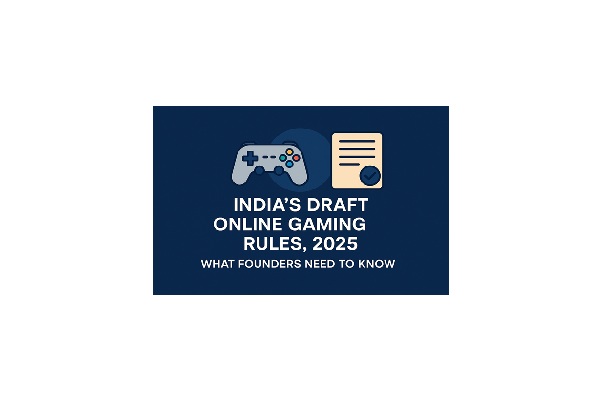On 20 August 2025, the Lok Sabha passed the Promotion and Regulation of Online Gaming Bill, 2025 (“the Bill”), marking a significant development in India’s digital regulatory architecture. The Bill embodies a dual regulatory approach. On the one hand, it seeks to encourage innovation and structured growth in the fields of e-sports, online social games, and educational games by introducing recognition, licensing, and oversight mechanisms. On the other hand, it imposes an absolute prohibition on online money gaming, citing its adverse socio-economic impact, potential to cause psychological harm such as addiction, and the attendant risks of fraud, money laundering, and other security-related concerns.
For clarity, the Bill categorises the sector into two distinct segments:
Part I – Permitted Gaming
A. Recognition of E-Sports: The Bill accords legal recognition to e-sports as a bona fide form of competitive sport. To qualify under this category, an online game must be part of multi-sport events, conducted in an organised and competitive format with individuals or teams playing under prescribed rules. It must also be recognised under the National Sports Governance Act, 2025 and registered with the competent authority. Further, the outcome of such games should depend solely on the skill of participants such as physical dexterity, mental agility, or strategic reasoning. While participation or entry fees may be charged to cover administrative costs, and players may receive performance-based prize money, any form of betting, wagering, or staking, whether by players or third parties, is strictly excluded.
To promote and develop the e-sports sector, the Central Government is empowered to take a wide range of measures. These include framing guidelines and standards for organising and conducting e-sports events, setting up training academies, research centres, and institutions to enhance skills and technological capabilities, and introducing incentive schemes, awareness campaigns, and public outreach initiatives to encourage innovation and entrepreneurship in e-sport technology platforms. Further, the Bill envisages close coordination with State Governments and recognised sporting federations to integrate e-sports within broader sporting policy frameworks, while also allowing the Government to prescribe any additional measures necessary for advancing the sector.
B. Recognition of Online Social Games: The Bill also accords formal recognition to online social games as a distinct category within the digital gaming ecosystem, with an emphasis on their recreational and educational role. The Bill defines an “online social game” as an online game that: (i) does not involve staking of money or other stakes, or participation with the expectation of monetary gain; (ii) may allow subscription or one-time access fees, provided such payments are not in the nature of stakes or wagers; (iii) is offered solely for entertainment, recreation, or skill-development purposes; and (iv) is not categorised as an online money game or an e-sport.
The Bill directs the Central Government to take necessary steps to recognise, categorise, and register online social games with the designated Authority or agency, while promoting their development and accessibility for recreational and educational purposes. These measures may include establishing registration mechanisms, creating platforms and programmes for development and distribution, ensuring access to safe and age-appropriate content, and conducting awareness initiatives to highlight the role of social games in recreation, skill-building, and digital literacy. Further, the Bill envisages coordination with State Governments and educational or recreational institutions to integrate social gaming into broader digital engagement strategies, along with any other steps necessary to promote this sector.
The Bill empowers the Central Government to establish or designate an Authority to regulate the online gaming sector. The Authority may determine whether a game qualifies as an online money game, recognise and register permitted online games, and exercise such other prescribed functions. Persons offering or facilitating permitted online games must comply with its directions, guidelines, or codes of practice. The Government may also prescribe matters relating to the Authority’s composition, qualifications, tenure, powers of the Chairperson, and mechanisms for complaint-handling and grievance redressal. Non-compliance with directions of the Authority may attract penalties up to ₹10 lakh, suspension or cancellation of registration, and prohibition from offering such games, subject to an opportunity of being heard.
Part II – Prohibited Gaming
The Bill imposes an absolute ban on online money games i.e., online game (skill based, chance based or both) when played on digital or electronic platforms that require a user to deposit money or any other form of stake with the expectation of receiving monetary or material returns. This formulation ensures that the prohibition applies irrespective of the underlying mechanics of the game, focusing instead on the element of financial wagering.
Specifically, the Bill prohibits:
- Persons from offering, aiding, abetting, inducing, or otherwise engaging in online money games or gaming services.
- Persons from making, aiding, abetting, inducing, or disseminating any advertisement, across print, broadcast, or electronic media, that directly or indirectly promotes online money game.
- Banks, financial institutions, and intermediaries from engaging in, aiding, abetting, inducing, or otherwise facilitating payments or fund transfers for online money gaming.
The Bills adopts a stringent approach towards violations of its prohibitions on online money games and the punishment prescribed under the Bill are as follows:
|
Offence |
Penalty (First Offence) |
Penalty (Repeat Offence) |
|
Offering or facilitating online money games, or processing related financial transactions |
Imprisonment up to 3 years, or fine up to ₹1 crore, or both |
Imprisonment up to 5 years and fine up to ₹2 crore |
|
Publishing, disseminating, or causing prohibited advertisements |
Imprisonment up to 2 years, or fine up to ₹50 lakh, or both |
Imprisonment up to 5 years and fine up to ₹2 crore |
In addition to prescribing stringent penalties, the Bill vests the Government and its designated officers with wide-ranging enforcement powers to secure compliance and deter violations. These include:
- Power to block access: The Government is authorised to direct the blocking of websites, applications, or digital platforms engaged in hosting or promoting online money games, by invoking provisions modelled on Section 69A of the Information Technology Act, 2000.
- Power of search and seizure: Designated enforcement officers are empowered to enter premises, inspect, and seize any material, equipment, or digital infrastructure suspected to be used in contravention of the Act, without the requirement of a prior warrant.
- Power of arrest: Such officers may also arrest individuals without warrant for offences under the Act, reflecting the strict criminal posture of the legislation.
- Cognisable and non-bailable classification: Offences under the Bill are expressly classified as cognisable and non-bailable, thereby authorising immediate police action without prior court approval and significantly restricting the scope for anticipatory or routine bail.
- Delegated investigative authority: The Central Government may, by notification, delegate investigative powers to officers of the Central Government, a designated Authority, or State Governments, ensuring that enforcement capacity is not limited to one body but can be extended across jurisdictions as required.
- Statutory Immunity: Further, the Bill provides statutory immunity to the Central Government, the Authority, and their officers for any act done in good faith.
Issues List:
1. Chilling Effect: The regulation of gaming in India traces its origins to the Public Gambling Act, 1867, which criminalised public gambling and the keeping of common gaming houses but expressly exempted “games of mere skill”. Following independence, most States adopted this framework or introduced their own laws containing this exemption, carrying forward the exemption for skill-based games. Over the decades, Indian courts repeatedly clarified the scope of “games of skill.” In RMD Chamarbaugwala (1957), the Supreme Court held that competitions substantially dependent on skill fall outside the ambit of gambling and are constitutionally protected under Article 19(1)(g). Later, the Punjab and Haryana High Court in Varun Gumber (2017) on fantasy sports, reinforced that games requiring knowledge, judgment, and analytical ability qualify as skill-based games and tantamount to business activities and are protected by Article 19(1)(g) of the Indian Constitution.
The continued exemption to skill-based games provided under the Public Gambling Act, states laws governing gambling together with repeated judicial affirmations, had led companies to legitimately believe that skill-based gaming was a legally safer option. The sudden reversal through a blanket prohibition on all forms of online money gaming creates a chilling effect on legitimate skill-based platforms, effectively wasting years of industry effort, investment, and innovation, while stifling entrepreneurship and technological growth in the sector.
2. Disproportionate Enforcement Powers - The enforcement provisions in the Bill, while aimed at ensuring compliance and deterrence, raise concerns of privacy, fairness, and overreach. The Bill allows officers to search, seize, and arrest without warrant, including accessing digital servers and devices, risking exposure of sensitive personal and commercial data. Offences are made cognisable and non-bailable, enabling prosecution without prior judicial approval and limiting bail, which could lead to arbitrary or disproportionate arrests in complex digital cases.
The Bill also permits automatic blocking of websites and apps, granting wide censorship powers that, without oversight, may affect legitimate platforms. Collectively, these powers risk intruding on civil liberties unless balanced with safeguards, transparency, and effective appeal mechanisms.
3. Central vs. State approach - The Bill provides for the Central Government’s legislative competence over the entire online gaming sector, including online money gaming services offered within or from outside India. However, this centralisation raises significant questions about its interaction with existing state laws, particularly because gambling and gaming legislation in India historically falls within the domain of state governments under the Constitution.
Over the years, states have had the autonomy to prohibit (wholly or partially), promote, or provide for licensing of skill-based games within their jurisdiction. This sudden banning of online money game creates a conflict with the states’ approach and as such may face significant resistance from states.
Even for games of mere skill which do not amount to an online money game, significant challenges arise. For example, it is unclear if company offering a skill based online game in Nagaland would be required to obtain only one license from the Authority under this statute or a second license under the Nagaland Prohibition of Gambling and Promotion and Regulation of Online Games of Skill Act, 2016. If a company is infact required to comply with central and state wide different compliances, it significantly increases the complexity and the compliance cost for a gaming company.
Author: Ms. Namrata Dubey, Senior Associate





